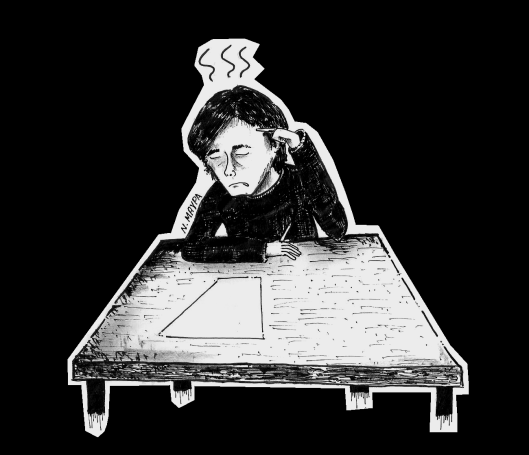by Michael Aaron C. Gomez
One of the greatest (predominantly) science-fiction writers who’d ever wrangled with a blank page, Kurt Vonnegut, was once given an assignment by the high-profile American magazine Rolling Stone to report about an equestrian event—where it happened evades memory now—and he was promptly stumped. He had done his fieldwork, of course, he had watched the actual thing, but when he had finally gathered himself and sat down before his typewriter, he still had no idea what to write. Hunched there before his machine and after having presumably ripped off some of his hair, Vonnegut decided to squeeze out a single sentence which he proceeded to ship off to his editor—the sentence went: “The horse jumped over the fence.”
And thus brings us to this how-to article about nothing.
Having wracked his brains for a day and a half trying to come up with a specific field with which he is reasonably adept and which is also relevant to much of the students who will read this paper, this contributor eventually decided to write his equivalent of Vonnegut’s Rolling Stone article and let it run wherever it may take him. He understands that he may be fired for writing about nothing, and he offers no excuses (well, maybe that his brain has suffered a systems crash) and fully accepts the consequences.
Sillimanians all over are understood to be smart and independent, which is actually the main reason this feature writer got confused with a how-to article: if one wants to learn how to cross-stitch, for example, he or she can simply ask his or her mother—failing that, he or she can turn to everybody’s best friend Mr. Google (next comes the other good friend Mr. Wikipedia).
But for this week’s article and for everybody’s well-being, here are some basic tips to remember:
1. STOP: Aside from stopping before crossing the road, STOP here would also mean stopping one’s tasks for a while and steeping oneself in silence and solitude—this is really helpful if the assignment is especially tough, like this article. Anyway, leaving everything behind (research papers, assignments, PowerPoint presentations) and forgetting it for a bit can be helpful, if only to remind yourself that there is a world beyond school and teachers out there, and that life is something much bigger than our obligations—it is something much bigger than humanity itself. Of course, you have to go back to work sooner or later, but at least your brain will be much more limber and fresh.
2. LOOK: Logically, this action will have to come after STOP—if you are crossing a street, for example, a stray look at an attractive man or woman will get you run over by a truck, so be careful. For this article, looking would also mean observing the world’s operations and the people living inside it. Watch the news once in a while, watch a movie (well, this goes without saying), watch a play: and afterward—this is very important—if you find what you see good, feel nice that the world isn’t such a nasty place after all, or conversely, if what you see turns out bad, speak out so that whoever is concerned may take a second look and do something about it. Want better CR facilities? Well, complain about them! Human interaction is the best way to maturity: there are times people will pick a fight with you because of the pettiest things, and this will be a test of how grown-up you are as a person. Sometimes a kid can be more mature than a forty-year-old, you know.
3. LISTEN: After you stop and look, the most inevitable step that follows is to listen: for another example, you listen to the low hum of a different truck that may have eluded your line of sight as you cross the road. One of the simplest and most overlooked skill in the world is—you guessed it—listening: there are times we don’t listen to our parents when they tell us to do stuff, times we ignore our teachers lecturing us, times we go deaf to our friends or boyfriends or girlfriends when they tell us something they feel is important. Failure to listen can be deadly—it could mean a fight with a parent, failing grades at the end of a semester, or worst, a breakup. Good decisions can only be made after one has absorbed the situation with his eyes and ears: if your girlfriend breaks up with you because you don’t know how to listen, you can whine endlessly on Facebook or you can actually start improving yourself.
To sum things up: well, of course, as always, study hard.~



